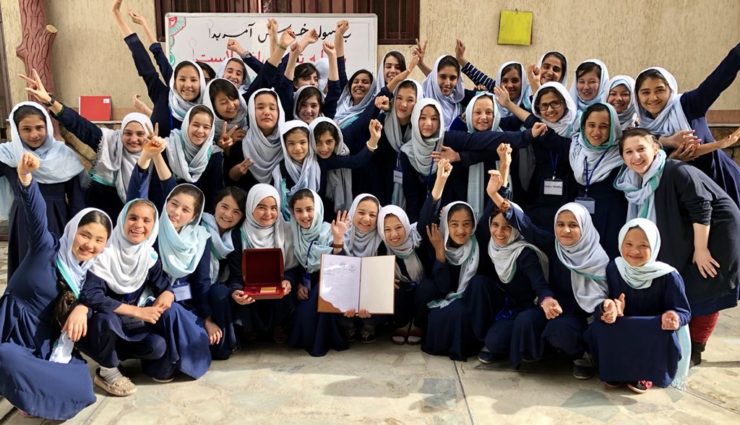The issue of education appears in the life of every person from the beginning of their educational process. From learning to produce first utterances and necessary life skills to gaining knowledge in various areas of life. Education stays with us long after we finish school. From my early teens, teaching was my interest and something I planned on doing in my life. When I started my education in teaching foreign languages, I had the opportunity to take part in various training courses on teaching methods, diversity among students and problems in the educational system. Today I know that an ideal teaching system does not exist, and what can be fixed lies in the hands of us — educators.

Educating young women in Afghanistan at SOLA Source: Carney Sandoe
The issue of education over decades…
Defined in 1989 and implemented in 1990, The United Nations Convention on the Rights of the Child in Article 28 emphasizes the importance of making education compulsory and accessible for all, as well as encouraging the development of secondary education and offering financial support if needed. Launched by the UN Summit in 2015, the Agenda 2030 for Sustainable Development seems to turn towards the issue of education again by defining new objectives in SDG 4 – Education promising to “ensure inclusive and equitable quality education and promote lifelong learning opportunities for all”. Being halfway to 2030, we already know that there are still many difficulties in achieving the Global Goals, also those related to education, because their achievement is influenced by many different factors, for example the number of trained staff, which is still insufficient in number, military conflicts or regimes.

Source: UNICEF
Transforming education – investing in the people of our future
In September 2022, the United Nations’ Transforming Education Summit took place. Due to the deepening education crisis caused, among others, by the Covid 19 pandemic, it aimed to re-examine goals and activities in the field of education. But it was not only the pandemic that left its mark on the quality and access to education. In Afghanistan, the political shift caused that girls and women were deprived of any rights to education, which is estimated at about 2.5 million (about 80%) school- aged girls who are out of school now. For this reason, it was decided that the International Day of Education 2023 will be devoted to the issue of education of Afghan girls and women and thus advance the SDG4 – Education.

Source: United Nations
”To invest in people, prioritize education”
In my next post, I will analyze the event of ,,International Day of Education 2023: To invest in people, prioritize education” where the issue of women’s education in Afghanistan and the actions taken to provide access to it are described, as well as, commitments made at the Summit to support countries and improve their education systems. According to the Sustainable Development Goals Record 2023 primary and secondary school completion rates are rising but the pace is slow and uneven. Education is a long-term process, and in addition to access to it, its quality, opportunities and support must be coordinated enough to lead to graduation and the acquisition of the intended skills. So is it still possible to reach those goals by 2030? How likely is it to be successful for women in Afghanistan? Please comment with your thoughts!

